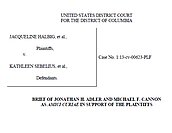Learn more about Cato’s Amicus Briefs Program.
The Patient Protection and Affordable Care Act of 2010 (“PPACA” or “Act”) provides “premium assistance tax credits” for the purchase of qualifying health insurance plans in health insurance Exchanges established by states under PPACA Section 1311, 42 U.S.C. § 18031. The Internal Revenue Service rule purporting to implement those premium-assistance tax credits is contrary to the plain language of the PPACA and cannot be justified on other grounds. The rule exceeds the agency’s authority and subverts congressional intent by subverting the balance Congress struck between the Act’s competing goals.
The PPACA mandates the creation of health insurance “exchanges” to regulate health insurance within each state; declares that “Each State shall .… establish” an Exchange; directs the federal government to establish one in states that do not; and offers health insurance subsidies to certain qualified taxpayers who enroll in a qualified health plan “through an Exchange established by the State under Section 1311.” This language originated in the Senate Finance Committee, was clarified and strengthened thereafter in the Senate, and was approved by both chambers of Congress and the President. The legislative history of the PPACA is fully consistent with the plain text of these provisions.
The authors of the PPACA conditioned premium-assistance tax credits on states establishing Exchanges to induce state cooperation. Specifically, to avoid “commandeering” the states, the PPACA’s authors offered premium-assistance tax credits as one among a number of financial inducements for states to perform this task for the federal government. Congress routinely conditions federal benefits to individuals—both via direct spending and the tax code— on their states’ carrying out congressional priorities. Indeed, conditioning premium-assistance tax credits on states’ establishing Exchanges (and enacting other health insurance measures) is far from the largest financial inducement that Congress created for states in the PPACA.
Contrary to the clear language and purpose of the statute, and without any reasoned basis, the IRS rule attempts to dispense premium-assistance tax credits in the 34 states that have opted not to establish an Exchange. Under the PPACA, those tax credits directly trigger penalties against employers and indirectly (but no less clearly) trigger penalties against individual taxpayers. The IRS rule therefore has the effect of triggering spending and imposing financial penalties that Congress never authorized. On that basis, the Plaintiffs’ challenge to that rule should be sustained.


